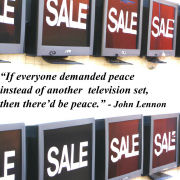Cannonballs and Butterflies
Armodoxy for Today: How many times?
In the early 1960’s, Bob Dylan wrote and sang a beautiful song which also became an anthem for an era and a generation. In “Blowing in the Wind” Dylan asks a series of questions beginning with, “How many roads must a man walk down before you call him a man?”
“The answer is blowing in the wind,” is his answer to each of the questions. It is a folk song where the poetic words reverberate with the thoughts and worries we may harbor. One question in particular strikes me today, “How many times must a cannonball fly before they’re forever banned?”
The history of the world is a history of war, blood and violence. In the last few years Hamas attacks Israel, Israel retaliates hundred fold. Russia attacks Ukraine, Ukraine fights back. World powers choose sides, supplying weapons and troops. Still fresh in our minds, we witnessed the cowardly barbaric actions of the Azeris that exiled a group of people from their historic lands, against the backdrop of silence from the world community. And the same silent atmosphere prevails around lesser-known hotspots, particularly in Darfur, Sudan and the Congo.
Ironically, we can only wish that they were hurling cannonballs at one another. The art of war has escalated so far that the answer is blowing in the wind – a wind carrying debris, the stench of death and nuclear fallout.
Economically, people complain of higher prices, but concerts and sporting events sell out with exorbitant prices tags on the tickets and Amazon reports record profits year after years, with an assortment of products, from electronics to housewares. I’m reminded of another one the many voices of the 1960’s, John Lennon, who once observed, “If everyone demanded peace instead of another television set, then there’d be peace.”
Could the answer to peace be as simple as that? That we merely must want it and, therefore, demand it? Certainly, we’re seeing Amazon rake in millions of dollars selling second, third or fourth television sets to people who demand it. Why are we not treating peace as something we want, and therefore demand? We have turned over the rights to geo-governance and determination to politicians and so-called leaders who have betrayed our confidence, to say it politely.
In these Armodoxy lessons, I’ve brought to you the message of Jesus Christ which the Armenian Church has followed for centuries. It is simple: Peace is at hand, our hands. God has endowed each and every one of us with the ability to create our story, personal as well as communal. Our eyes are before us, not behind us. Look forward. In Jesus’ words, “Seek first God’s kingdom and His righteousness.” (Matthew 6:33) The answer may be blowing in the wind. Catch it and realize we hold that answer.
I leave you today with one of my favorite anecdotes of a young monk who is determined trick his master with a simple question. With his hands behind his back, he says, “Master, tell me, is the butterfly in my hand dead or alive?” The young boy thought he cornered his elderly teacher in a place he could not escape. If he says, the butterfly is alive, I will crush it in my hand, he thought, And if he says, it is dead, I will open my hand to let the butterfly fly away.
The master was truly worthy of that title. He looked at the young monk in the eye: “The answer,” he said, “Is in your hand.”

 2025 Fr Vazken
2025 Fr Vazken

 2023 Fr. Vazken Movsesian
2023 Fr. Vazken Movsesian 2025 Epostle
2025 Epostle



 2025 Fr Vazken
2025 Fr Vazken 2024 Fr Vazken
2024 Fr Vazken
Leave a Reply
Want to join the discussion?Feel free to contribute!